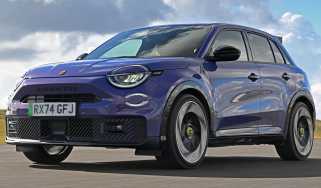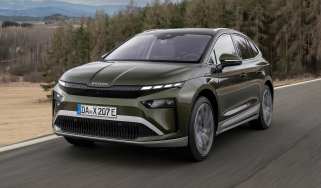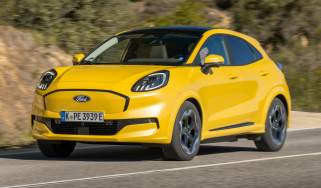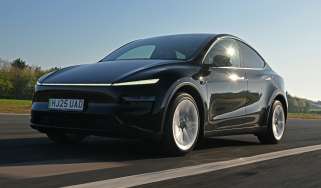What is fast charging? What is rapid charging? What is ultra-rapid charging? EV charging speeds explained
AC fast charging, DC rapid charging and DC ultra-rapid charging are important to understand for electric car owners, so let us explain…
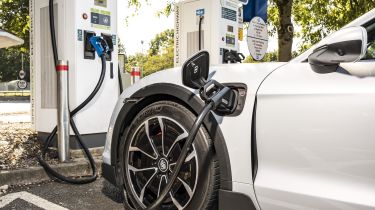
There are a number of different types of electric car chargers available to the zero-emissions motorist in the UK. You may have heard the terms 'AC charging' and 'DC charging' used in relation to these, as well as more descriptive phrases such as 'fast', 'rapid' and 'ultra-rapid' charging.
While almost all electric cars are compatible with the various types of charger on offer, different chargers operate at different speeds and therefore some will take longer than others to fully replenish your battery. Understanding the different charging options for your electric vehicle can be crucial in unlocking its full potential.
So what’s the difference between fast charging, rapid charging and ultra-rapid charging, how do they work and where can you find them? Let’s find out…
AC and DC: fast, rapid and ultra-rapid charging for electric cars explained
Electric-car batteries have to be charged with direct current (DC), but typical household three-pin sockets – and home wallbox chargers – draw alternating current (AC) from the grid. To convert AC to DC, all fully electric and plug-in hybrid vehicles feature a built-in converter, or rectifier.
The extent of the converter's capability to turn AC into DC partly determines the vehicle's charging speed. So-called 'fast chargers' are rated between 7kW and 22kW. They draw AC current from the grid and rely on the car’s converter to turn it into DC. A typical fast AC charger can fully recharge a small electric car in three to four hours. Chargers like these can often be found on high streets or in shopping-centre car parks – places where cars are normally parked for a couple of hours at a time.
If you need to top up quicker than that – for example, in the middle of a long journey – then your best bet is a rapid charger. There are two kinds: rapid AC charging provides more power, at 43kW, than conventional fast AC charging, but the process is the same – AC is converted into DC by the electric car's own converter.
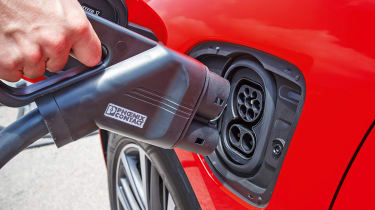
The second (and much more popular) method of rapid charging supplies DC current straight to the car, bypassing the converter, allowing the car to charge much faster. DC rapid chargers are more expensive to install, which is why it took a while for significant numbers of them to appear. But, not only do they work at 50kW or more, as of March 2024, there are more than 11,609 rapid and ultra-rapid chargers spread across the UK across more than 5,261 locations, with more on the way. These are often found at 'charging hubs' in motorway service areas or close to major A-roads.
These days, providers are also installing more and more DC ultra-rapid chargers that typically supply power at 100kW or more. There are 11,609 ultra-rapid units like this now live in the UK as of 2024. The fastest are even capable of up to 350kW and you’ll find these in a few locations operated by the Fastned, IONITY, Osprey and Gridserve Electric Highway charging networks.
What's more, only a handful of electric cars are capable of charging at close to those speeds. There are a few more of these 350kW chargers dotted at Porsche Dealerships across the country that are available for public access as long as you have the correct charge cards and the dealership isn’t using it to charge one of its Taycans or Macans.
Tesla’s Supercharger network is one of the most popular DC rapid-charging networks around. Its widespread 'V3' units are capable of up to 250kW, as are the new ‘V4’ chargers that will expand Supercharger access to non-Tesla vehicles – though the company has apparently future-proofed the V4 chargers, so they may be capable of delivering more power in future. Below is a rough breakdown of the main charging speeds available.
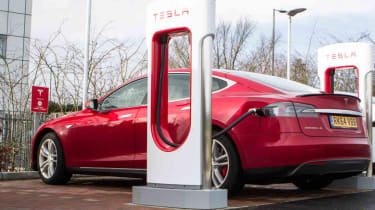
Can any electric car use a fast or rapid charger?
The short answer is no, as it depends on what type of connector your car uses. The majority of electric cars you can buy feature a Type 2 connector, however some older models may have a Type 1 or Commando connector. These can sometimes be found on certain AC fast chargers, but these units are far less common now.
Most AC and DC fast chargers use a Type 2 connector, although your car may not be able to recharge at the maximum speed offered by each unit. For example, the maximum charging capacity of the entry-level Renault ZOE is 22kW, so even if you plugged one into a charger capable of much faster speeds, it won't get you topped up any quicker. In fact, the car will automatically limit the power it receives to prevent damage to the battery.
It's a similar story for DC rapid and ultra-rapid chargers. Whether or not your electric car can use them depends on two factors: its maximum charging capacity and which connector types it accepts. Rapid DC chargers use two types of connector: CCS and CHAdeMO. The latter is less common and used by a very small selection of new cars like the Nissan Leaf and Lexus UX 300e, though you’ll find it on a selection of older models like the Mitsubishi iMiEV and Outlander PHEV, and the Nissan e-NV200 van.
Instead, almost all new electric cars from the electric Fiat 500 and MG4 EV, all the way up to the Porsche Taycan and BMW iX, feature a CCS connector. This is also the connector you’ll find on ultra-rapid 150-350kW charging points.
Check your car’s manual or brochure to find out which connector it has. The good news is that most DC rapid-charging stations in the UK offer both CCS and CHAdeMO connectors, so you won’t be caught short wherever you stop for a recharge.
Are rapid and ultra-rapid chargers more expensive to use than fast chargers?
Yes, in most cases the tariffs for rapid and ultra-rapid charging are higher than for slow or fast charging. But just like with petrol or diesel, prices can differ depending on which charging network a particular rapid charger is operated by.
For example, InstaVolt charges a flat rate of 85p per kWh, while BP Pulse charges differently depending on if you’re a member, a subscriber or a pay-as-you-go user. Its prices range from 44-85p per kWh depending on the speed of the charger you use, and there are overstay fees for using faster units for over 90 minutes. Meanwhile, Tesla owners who use the brand's Supercharger network can expect to pay an average of 67p/kWh and for non-Tesla owners, the current average is 77p p/kWh.
Current tariffs are always clearly displayed on charging providers' websites, so check there for the most up-to-date pricing information and fees.
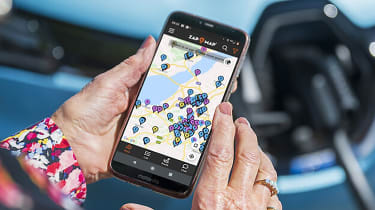
Where to find rapid and ultra-rapid chargers
The Zap-Map website and its accompanying app are popular tools for electric and plug-in hybrid drivers, as you can use filters to find the exact type of charger you need. You select the type of connector you need to use, the maximum charging speed and even which network they’re on. The map will also show you how many chargers are at each location, how much they’ll cost to use and if they’re in use or not.
Bonnet is another great app that can help you find nearby charging points, tell the speeds each unit is capable of and you can use it to pay for your charging sessions as well. Alternatively, electric and plug-in hybrid cars' sat navs often feature databases with charger locations in case you’re running low on battery mid-journey.
Will frequent fast or rapid charging damage my battery?
Lithium-ion batteries, the type found in electric cars and PHEVs, deplete over time, just like any other form of battery. And while the batteries found in laptops and mobile phones can be damaged if they're charged at high power consecutively, electric vehicle batteries won’t. This is because manufacturers have built in safety systems to prevent damage from frequent use of rapid or fast charging. For example, the rate of charge can be automatically lowered if the car thinks too much power is being supplied to the battery too often.
The most recent data from Tesla, released in April 2023, suggested it sees around 12% battery degradation after 200,000 miles of driving. The data didn’t include the degree to which rapid charging contributed to that fall-off, but given higher-mileage cars are likely to need more charging out and about than locally-driven ones, the data suggests that good battery management may reduce the risk of even fairly regular rapid charging. At the very least, it’s something the first few owners of an EV may not need to worry about too much.
It is also worth noting that in 2019, a company called Geotab carried out a test on battery degradation. This was carried out on over 6,000 different cars in a controlled test. In this test they came to the conclusion that with the average use, which includes the use of fast or rapid charging between 0 to 3 times a month, a battery will decline by 2.3 per-cent each year. That means that if you start with a range of 250 miles, after 10 years your EV battery should still be capable of achieving 192 miles. The survey also showed that in ideal conditions such as ‘ideal climate’ and using slower speed chargers, such as a home wall box, degradation can be reduced to 1.6 per-cent every year.

